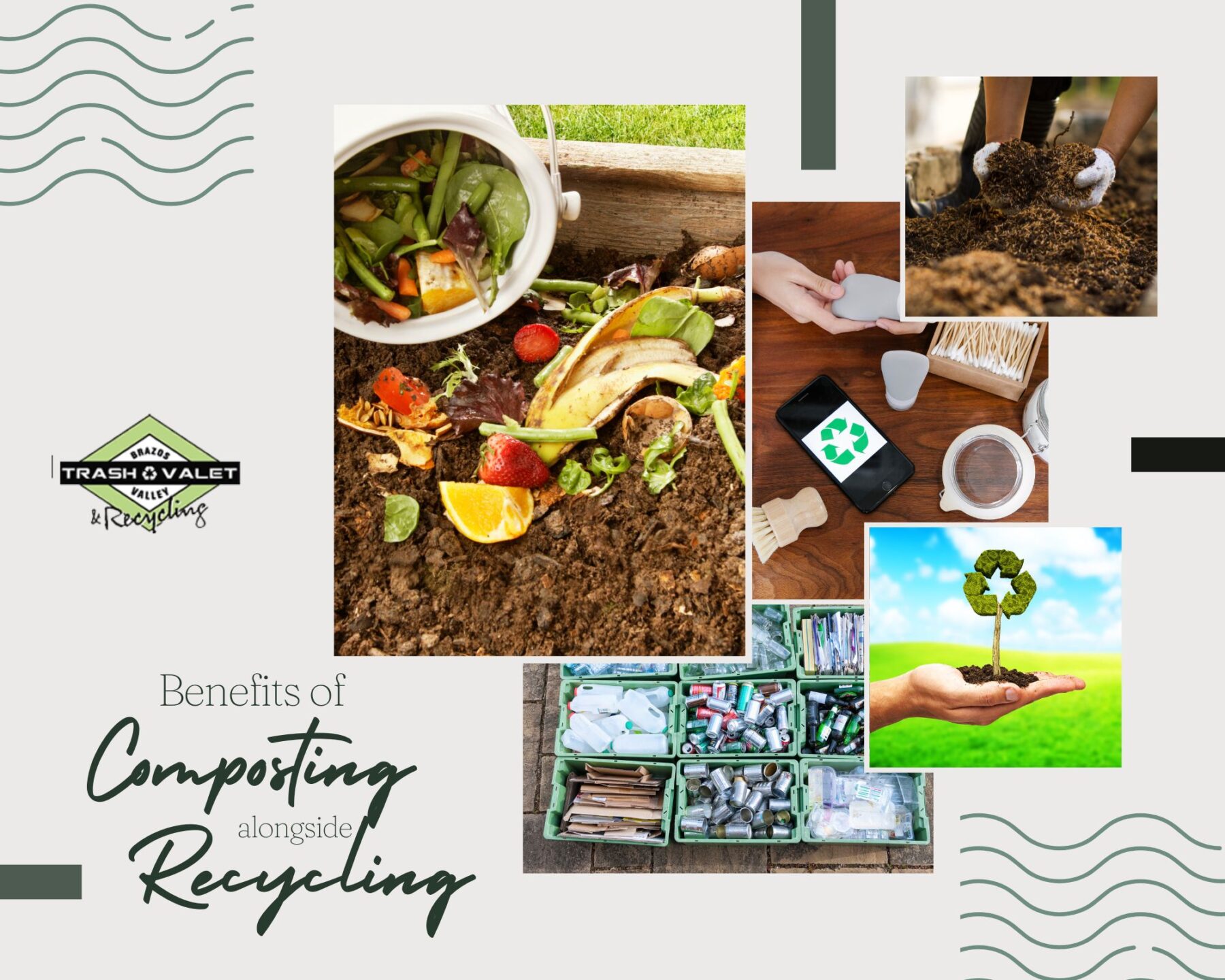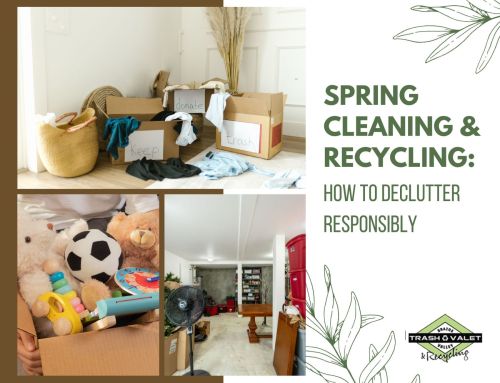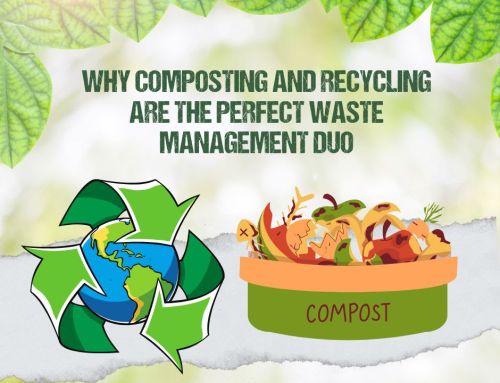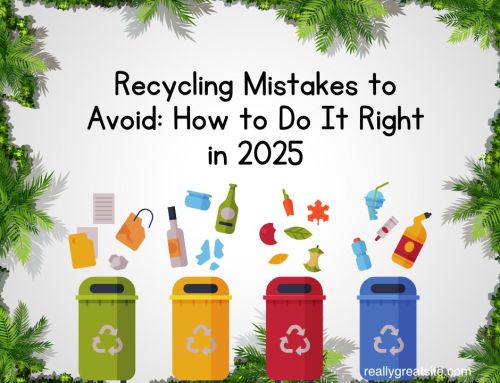The Benefits of Composting Alongside Recycling
In our quest for a more sustainable lifestyle, both composting and recycling play pivotal roles. While recycling is widely recognized for its ability to transform waste materials into new products, composting is an equally valuable process that turns organic waste into nutrient-rich soil. When combined, these two practices can significantly reduce the amount of waste we send to landfills, lower greenhouse gas emissions, and promote a healthier environment. Here’s how composting alongside recycling can enhance your sustainable efforts.

Reducing Landfill Waste
One of the most immediate benefits of composting and recycling is the reduction in landfill waste. Landfills are a significant source of methane, a potent greenhouse gas that contributes to climate change. By diverting organic waste to composting and recyclable materials to appropriate facilities, we can drastically decrease the volume of waste that ends up in landfills. This not only reduces methane emissions but also extends the lifespan of existing landfill sites.
Enriching Soil and Supporting Plant Growth
Composting transforms kitchen scraps, yard clippings, and other organic materials into a rich, dark soil amendment known as compost. This compost can be used to improve soil structure, provide essential nutrients to plants, and enhance water retention in gardens and landscapes. Unlike synthetic fertilizers, compost is natural and free from harmful chemicals, making it an environmentally friendly way to boost plant health and productivity.
Saving Energy and Resources
Recycling conserves energy and natural resources by reprocessing materials such as paper, plastic, glass, and metal into new products. For instance, recycling aluminum cans saves 95% of the energy required to make the same amount of aluminum from raw materials. Similarly, recycling paper saves trees and reduces the need for water and energy-intensive production processes. When we recycle, we lessen the demand for virgin materials, which helps preserve ecosystems and reduce the environmental impact of resource extraction.
Reducing Greenhouse Gas Emissions
Both composting and recycling contribute to the reduction of greenhouse gas emissions. Composting organic waste prevents the release of methane from decomposing organic matter in landfills. Additionally, the composting process itself helps sequester carbon in the soil. Recycling, on the other hand, reduces the need for energy-intensive manufacturing processes, which often rely on fossil fuels. By lowering the overall demand for energy, recycling helps decrease carbon dioxide emissions and other pollutants.
Encouraging Sustainable Habits
Incorporating both composting and recycling into daily routines encourages sustainable habits and fosters a greater awareness of waste management. When individuals understand the impact of their waste and the benefits of composting and recycling, they are more likely to make conscious choices about consumption and disposal. This shift in mindset can lead to broader community efforts to promote sustainability and protect the environment.
Practical Tips for Getting Started
- Set Up a Compost Bin: Choose a compost bin or pile that suits your living situation. Both outdoor and indoor options are available, making composting accessible even in small spaces.
- Separate Organic Waste: Collect kitchen scraps, coffee grounds, eggshells, and yard waste for your compost bin. Avoid adding meat, dairy, and oily foods, as they can attract pests and slow down the composting process.
- Recycle Correctly: Familiarize yourself with local recycling guidelines to ensure you’re sorting materials correctly. Rinse containers and remove any non-recyclable components, such as plastic caps or labels.
- Educate and Advocate: Share your knowledge of composting and recycling with friends, family, and neighbors. Encourage others to adopt these practices and support local initiatives that promote waste reduction.
In conclusion, composting alongside recycling offers a powerful combination for achieving a more sustainable lifestyle. By reducing landfill waste, conserving energy and resources, lowering greenhouse gas emissions, and enriching soil, these practices work together to create a healthier and more resilient environment. Embrace the benefits of composting and recycling today to make a positive impact on our planet.
Share This Story, Choose Your Platform!
The Benefits of Composting Alongside Recycling
In our quest for a more sustainable lifestyle, both composting and recycling play pivotal roles. While recycling is widely recognized for its ability to transform waste materials into new products, composting is an equally valuable process that turns organic waste into nutrient-rich soil. When combined, these two practices can significantly reduce the amount of waste we send to landfills, lower greenhouse gas emissions, and promote a healthier environment. Here’s how composting alongside recycling can enhance your sustainable efforts.

Reducing Landfill Waste
One of the most immediate benefits of composting and recycling is the reduction in landfill waste. Landfills are a significant source of methane, a potent greenhouse gas that contributes to climate change. By diverting organic waste to composting and recyclable materials to appropriate facilities, we can drastically decrease the volume of waste that ends up in landfills. This not only reduces methane emissions but also extends the lifespan of existing landfill sites.
Enriching Soil and Supporting Plant Growth
Composting transforms kitchen scraps, yard clippings, and other organic materials into a rich, dark soil amendment known as compost. This compost can be used to improve soil structure, provide essential nutrients to plants, and enhance water retention in gardens and landscapes. Unlike synthetic fertilizers, compost is natural and free from harmful chemicals, making it an environmentally friendly way to boost plant health and productivity.
Saving Energy and Resources
Recycling conserves energy and natural resources by reprocessing materials such as paper, plastic, glass, and metal into new products. For instance, recycling aluminum cans saves 95% of the energy required to make the same amount of aluminum from raw materials. Similarly, recycling paper saves trees and reduces the need for water and energy-intensive production processes. When we recycle, we lessen the demand for virgin materials, which helps preserve ecosystems and reduce the environmental impact of resource extraction.
Reducing Greenhouse Gas Emissions
Both composting and recycling contribute to the reduction of greenhouse gas emissions. Composting organic waste prevents the release of methane from decomposing organic matter in landfills. Additionally, the composting process itself helps sequester carbon in the soil. Recycling, on the other hand, reduces the need for energy-intensive manufacturing processes, which often rely on fossil fuels. By lowering the overall demand for energy, recycling helps decrease carbon dioxide emissions and other pollutants.
Encouraging Sustainable Habits
Incorporating both composting and recycling into daily routines encourages sustainable habits and fosters a greater awareness of waste management. When individuals understand the impact of their waste and the benefits of composting and recycling, they are more likely to make conscious choices about consumption and disposal. This shift in mindset can lead to broader community efforts to promote sustainability and protect the environment.
Practical Tips for Getting Started
- Set Up a Compost Bin: Choose a compost bin or pile that suits your living situation. Both outdoor and indoor options are available, making composting accessible even in small spaces.
- Separate Organic Waste: Collect kitchen scraps, coffee grounds, eggshells, and yard waste for your compost bin. Avoid adding meat, dairy, and oily foods, as they can attract pests and slow down the composting process.
- Recycle Correctly: Familiarize yourself with local recycling guidelines to ensure you’re sorting materials correctly. Rinse containers and remove any non-recyclable components, such as plastic caps or labels.
- Educate and Advocate: Share your knowledge of composting and recycling with friends, family, and neighbors. Encourage others to adopt these practices and support local initiatives that promote waste reduction.
In conclusion, composting alongside recycling offers a powerful combination for achieving a more sustainable lifestyle. By reducing landfill waste, conserving energy and resources, lowering greenhouse gas emissions, and enriching soil, these practices work together to create a healthier and more resilient environment. Embrace the benefits of composting and recycling today to make a positive impact on our planet.




